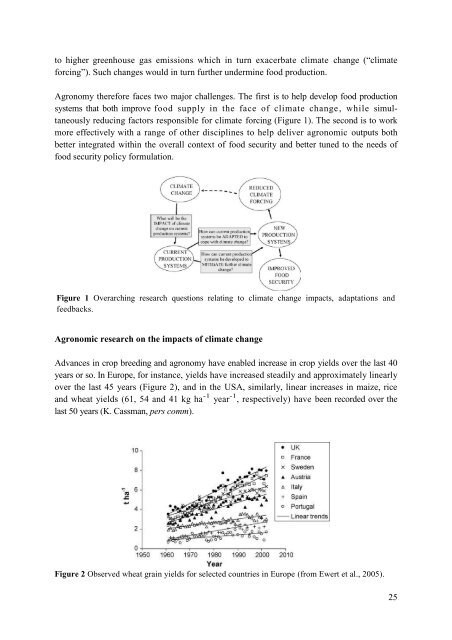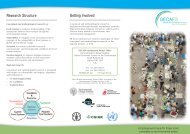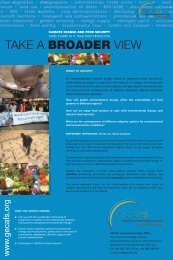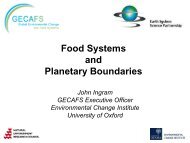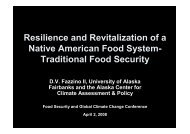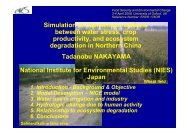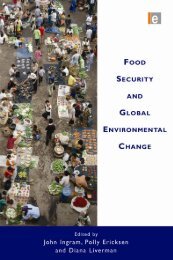Paper 2: The role of agronomic research in climate change and security policyAdapted from:Ingram, JSI, PJ Gregory and A-M Izac. 2008. The role of agronomic research in climatechange and food security policy. Agriculture, Ecosystems and Environment 126, 4-12.IntroductionHuman activities related <strong>to</strong> the production, supply and consumption of food, are partlyresponsible for changing the world’s climate and giving rise <strong>to</strong> other, globally and locallyimportant environmental changes. Such environmental changes include those infreshwater supplies, carbon and nitrogen cycling, biodiversity, and land cover and soils(Vi<strong>to</strong>usek et al., 1997; Steffen et al., 2004). While climate change may bring benefits <strong>to</strong> someparts of the world, especially northern latitudes above about 55°, there is growing concernthat overall these changes, and especially those associated with climate, will furthercomplicate achieving food security for those in the developing world. This is due <strong>to</strong> thegenerally predicted deleterious impacts on agriculture, in particular in tropical and subtropicalcountries (Fischer et al., 2001; Rosegrant and Cline, 2003; Parry et al., 2004; HadleyCentre, 2006; Stern, 2006). There are three main reasons: first, many parts of the developingworld are anticipated <strong>to</strong> be exposed <strong>to</strong> significant changes in temperature and rainfall patterns.Climate assessments for Southern Africa, for instance, conclude that the region willbecome warmer and drier (Hulme et al., 2001); a temperature increase of 2–5 °C is predictedover coming decades (IPCC, 2001) and increasingly variable rainfall is anticipated, withthe region becoming generally drier, especially in the east (Scholes and Biggs, 2004). Anincrease in both frequency and intensity of extreme events (droughts and floods) is alsoanticipated (IPCC, 2001; Tyson et al., 2002b). Second, developing economies areparticularly sensitive <strong>to</strong> the direct impacts of climate change given their often heavydependence on agriculture and ecosystems, and because of their high poverty levels andgeographic exposure (Stern, 2006). Third, many people in the developing world depend directlyon agriculture as their primary source of food, and negative impacts on crop productivity willaffect crop production and thereby overall food supply at the local level.To compound the anticipated negative impacts of climate change on crop production, overalldemands for food will increase as global population continues <strong>to</strong> rise from the ca. 6 billionpeople <strong>to</strong>day <strong>to</strong> an anticipated ca. 9 billion by 2050 (UN, 2004). It is clear that overall cropproduction will need <strong>to</strong> continue <strong>to</strong> increase by 50% over the next few decades <strong>to</strong> meet thisanticipated demand, although predicting future global food production is complex (Döös,2002). This brings further concerns that, if the rising demand for food is met through currenttechnologies and cropping practices, further environmental degradation is inevitable (Tilmanet al., 2002; Bruinsma, 2003). An example is that the increased use of fertilisers would lead24
<strong>to</strong> higher greenhouse gas emissions which in turn exacerbate climate change (“climateforcing”). Such changes would in turn further undermine food production.Agronomy therefore faces two major challenges. The first is <strong>to</strong> help develop food productionsystems that both improve food supply in the face of climate change, while simultaneouslyreducing fac<strong>to</strong>rs responsible for climate forcing (Figure 1). The second is <strong>to</strong> workmore effectively with a range of other disciplines <strong>to</strong> help deliver agronomic outputs bothbetter integrated within the overall context of food security and better tuned <strong>to</strong> the needs offood security policy formulation.Figure 1 Overarching research questions relating <strong>to</strong> climate change impacts, adaptations andfeedbacks.Agronomic research on the impacts of climate changeAdvances in crop breeding and agronomy have enabled increase in crop yields over the last 40years or so. In Europe, for instance, yields have increased steadily and approximately linearlyover the last 45 years (Figure 2), and in the USA, similarly, linear increases in maize, riceand wheat yields (61, 54 and 41 kg ha -1 year -1 , respectively) have been recorded over thelast 50 years (K. Cassman, pers comm).Figure 2 Observed wheat grain yields for selected countries in Europe (from Ewert et al., 2005).25
- Page 1 and 2: From Food Production to Food Securi
- Page 3 and 4: From Food Production to Food Securi
- Page 5 and 6: Table of ContentsAbstract .........
- Page 7 and 8: Paper 6: Undertaking Research at th
- Page 9: AbstractFood security is a conditio
- Page 12 and 13: 2010 about 925 million people had t
- Page 14 and 15: water) are used, and reduce negativ
- Page 16 and 17: While the flow of the argument abou
- Page 18 and 19: determine interactions along and be
- Page 20 and 21: Paper 3: A Food Systems Approach to
- Page 23: From Food Production to Food Securi
- Page 26 and 27: concerns and are now issues that mu
- Page 28 and 29: the relationships between GEC and f
- Page 30 and 31: Theme 2 aims to understand how comm
- Page 32 and 33: GEC and the Food System of the Indo
- Page 36 and 37: These advances have resulted from a
- Page 38 and 39: Crop selection to determine mechani
- Page 40 and 41: Agronomic science is central to imp
- Page 42 and 43: Agronomic research in relation to f
- Page 44 and 45: The discussion above identifies a n
- Page 46 and 47: interventions and political inertia
- Page 48 and 49: While research on producing food ha
- Page 50 and 51: Box 1 Food system Activities and fo
- Page 52 and 53: In addition to broadening the debat
- Page 54 and 55: options. Examples already seen rang
- Page 56 and 57: Figure 3 Outcomes for 10 variables
- Page 58 and 59: Figure 4 Nine ‘planetary boundari
- Page 60 and 61: Figure 5 Environmental change, food
- Page 62 and 63: Table 1: Indicative analysis of the
- Page 65: From Food Production to Food Securi
- Page 68 and 69: Trade Agreement (NAFTA) and the Eur
- Page 70 and 71: Parry et al., 2005). Conducting foo
- Page 72 and 73: is provided in the ESF/COST Forward
- Page 74 and 75: Paper 5: Engaging Stakeholders at t
- Page 76 and 77: into actions (strategies, policies,
- Page 78 and 79: Box 2 Engaging with stakeholders in
- Page 80 and 81: Box 3 Setting the research agenda f
- Page 82 and 83: Third, and of considerable practica
- Page 84 and 85:
Figure 2: Organizing and understand
- Page 86 and 87:
organizations made up of numerous n
- Page 88 and 89:
Elements of good practice in stakeh
- Page 90 and 91:
Finally, it is worth noting that fo
- Page 92 and 93:
development (Lee, 1999; Gunderson a
- Page 94 and 95:
Box 7 The GECAFS stakeholder survey
- Page 96 and 97:
‘break down’ what might be a hi
- Page 98 and 99:
Paper 6: Undertaking Research at th
- Page 100 and 101:
agriculture in many parts of the wo
- Page 102 and 103:
gaps. The presence of a strong tech
- Page 104 and 105:
an average of two years to coalesce
- Page 106 and 107:
Institute for Meteorology and Hydro
- Page 108 and 109:
Identifying case study sitesResearc
- Page 110 and 111:
can both benefit from and contribut
- Page 112 and 113:
Box 5 Mapping stakeholder interests
- Page 114 and 115:
Holding planning meetings in locati
- Page 116 and 117:
This reorientation of the debate fr
- Page 118 and 119:
Importance of this type of research
- Page 120 and 121:
Integrating the food system concept
- Page 122 and 123:
awareness of the GEC issues within
- Page 124 and 125:
pollutants were then introduced as
- Page 126 and 127:
communities operating in food syste
- Page 128 and 129:
Improving input-use efficiency acro
- Page 130 and 131:
governance focuses on the range of
- Page 132 and 133:
Developing research agendas in supp
- Page 134 and 135:
The renewed approach to interdiscip
- Page 136 and 137:
BIELAK, A., HOLMES, J., SAVGÅRD, J
- Page 138 and 139:
EAKIN, H. 2010. What is Vulnerable?
- Page 140 and 141:
GODFRAY, H. C. J., BEDDINGTON, J. R
- Page 142 and 143:
INGRAM, J. S. I. & FERNANDES, E. C.
- Page 144 and 145:
LYUTSE, S. 2010. The One Billion To
- Page 146 and 147:
RAYNER, S. & MALONE, E. L. 1998. Hu
- Page 148 and 149:
UNDP 2006. The 2006 Human Developme
- Page 150 and 151:
activities “from plough to plate
- Page 152 and 153:
contribution to the science agenda:
- Page 154 and 155:
urgently needed, and - given the gr
- Page 156 and 157:
GECAFS plannenmakerij stelde vast d
- Page 158 and 159:
ieder hun eigen groep van betrokken
- Page 160 and 161:
het gebied van beheer hebben betrek
- Page 162:
Curriculum VitaeFollowing a BSc in


